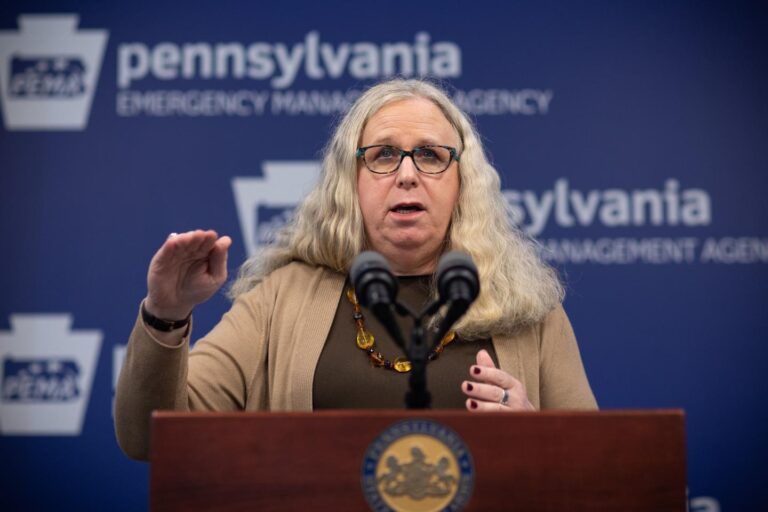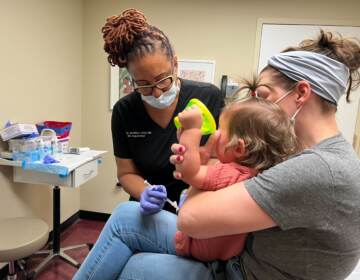Coronavirus update: New COVID-19 testing guidance for Philly protesters
Philadelphia officials recommend anyone who was at a George Floyd protest to get a COVID-19 test after seven days.

Pennsylvania Health Secretary Rachel Levine (Commonwealth Media Services)
Updated at 8:15 p.m.
–
Pennsylvania reported 511 new cases of COVID-19 Wednesday afternoon bringing the total number of cases to 77,780. To date 5,742 state residents have died.
New COVID-19 testing guidance for Philly protesters
Philadelphia officials recommend anyone who was at a George Floyd protest to get a COVID-19 test after seven days.
The large crowds, which make it hard to social distance, lead to a higher chance of exposure.
Even if demonstrators wore a mask during a protest, Philadelphia officials say attendees should keep a close eye for developing COVID-19 symptoms for the next 14 days.
Symptoms include fever, cough, and shortness of breath.
Ideally, protestors should keep away from others for 14 days. If that’s not an option, officials suggest wearing a mask and observing social distancing guidelines when out.
When seeking a test, protesters do not need to disclose they were at a demonstration. They can simply say they think they were exposed to someone who may have had the virus.
Southeast Pa. scheduled to move into yellow phase Friday
Southeastern Pennsylvania, including Philadelphia, is still slated to ease some social distancing measures and enter the “yellow phase” Friday, said Health Secretary Rachel Levine Wednesday.
Under the new guidelines, residents would be able to resume real estate activities, auto sales, and warehouse operations.
Food trucks and restaurants would be able to take walk-up ordering, though dine-in services are still off the table.
Levine said moving phases is based on the number of cases in the region over the past two weeks, the number of cases per capita, and the availability of hospital beds.
The percentage of COVID-19 tests that come back positive are also a metric for easing restrictions and they have been decreasing across the state, approaching 5%, said Levine.
Creating a network for contact tracing is also important for reopening. Levine said the state currently has 380 people trained for the work, though that number does not include contact tracers from local health departments. A similar training is taking place at Penn State’s College of Medicine. Levine said 46 medical students are helping in the effort.
Aiding in state efforts to create a robust contact tracing program, which Levine would like to see in the thousands, the health department will be training 200 Temple University students in the process.
“All of that goes into our decisions, but we’re very comfortable with Southeast Pennsylvania,” said Levine.
Still, the decision to reopen is made in concert with local officials. In Philadelphia, days of massive protests have been taking place since the weekend and could lead to a bump in cases, according to local officials.
On Wednesday, Mayor Jim Kenney said he hadn’t made a final decision about moving to the “yellow phase.”
“I don’t know yet. We have been talking about that based on what we are going through this week,” he said. “I think the numbers indicate that we are certainly there, it’s whether or not we can handle it in the course of this lockdown that we are in.”
Kenney did not say what factors might prevent the city from moving into the yellow.

Get daily updates from WHYY News!
Philly firefighter dies of COVID-19
Philadelphia firefighter Eric Gore has died from COVID-19, according to Mayor Jim Kenney.
Gore was 48 years old, and had served as a firefighter for nearly 24 years. He died on Tuesday at Temple University Hospital. He is survived by his wife, daughter, mother, and brother Lamont Gore, who is also a firefighter.
During a press conference Wednesday afternoon, Kenney and Police Commissioner Danielle Outlaw said, respectively, that the coronavirus pandemic and the acts of vandalism and looting seem to be waning.
“Looting and vandalism are slowing down,” said Outlaw. “As we get more resources to deploy, we can assign strategically to certain areas.”
Nevertheless, both threats remain: the COVID-19 deaths are still mounting – yesterday the Department of Public Health announced 153 new cases and three new deaths – and the National Guard will remain in Philadelphia for an undetermined time to help quell criminal acts during this period of social unrest.
Kenney said the pandemic numbers are moving into a range that will allow the Philadelphia region to enter the yellow reopening zone by the end of the week, but the crowds gathering by the thousands for protest events may thwart that goal.
WHYY’s Tom MacDonald contributed reporting.
WHYY is your source for fact-based, in-depth journalism and information. As a nonprofit organization, we rely on financial support from readers like you. Please give today.



![CoronavirusPandemic_1024x512[1]](https://whyy.org/wp-content/uploads/2020/03/CoronavirusPandemic_1024x5121-300x150.jpg)



